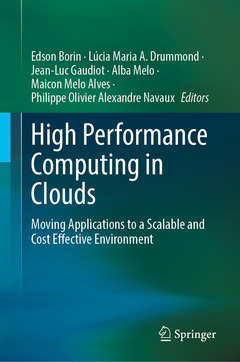High Performance Computing in Clouds, 1st ed. 2023 Moving HPC Applications to a Scalable and Cost-Effective Environment

This book brings a thorough explanation on the path needed to use cloud computing technologies to run High-Performance Computing (HPC) applications. Besides presenting the motivation behind moving HPC applications to the cloud, it covers both essential and advanced issues on this topic such as deploying HPC applications and infrastructures, designing cloud-friendly HPC applications, and optimizing a provisioned cloud infrastructure to run this family of applications. Additionally, this book also describes the best practices to maintain and keep running HPC applications in the cloud by employing fault tolerance techniques and avoiding resource wastage.
To give practical meaning to topics covered in this book, it brings some case studies where HPC applications, used in relevant scientific areas like Bioinformatics and Oil and Gas industry were moved to the cloud. Moreover, it also discusses how to train deep learning models in the cloud elucidating the key components andaspects necessary to train these models via different types of services offered by cloud providers.
Despite the vast bibliography about cloud computing and HPC, to the best of our knowledge, no existing manuscript has comprehensively covered these topics and discussed the steps, methods and strategies to execute HPC applications in clouds. Therefore, we believe this title is useful for IT professionals and students and researchers interested in cutting-edge technologies, concepts, and insights focusing on the use of cloud technologies to run HPC applications.
Date de parution : 07-2023
Ouvrage de 334 p.
15.5x23.5 cm
Thèmes de High Performance Computing in Clouds :
Mots-clés :
High Performance Computing; Cloud Computing; Bioinformatics; Parallel and Distributed Computing; Deep Learning; Scientific Computing; Oil and Gas Industry; Big Data; MPI Applications; Preemptible Virtual Machines; Elastic Applications; Cloud-friendly Applications; High-performance cloud computing; Efficient cloud computing; Cloud execution cost optimization



